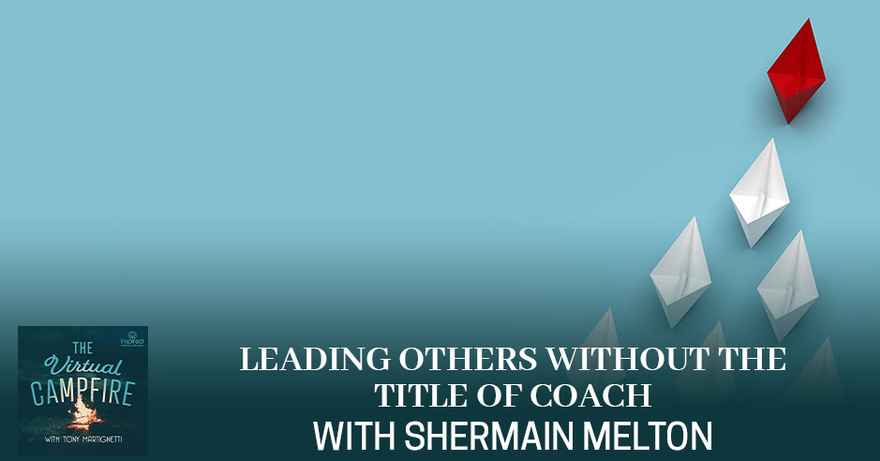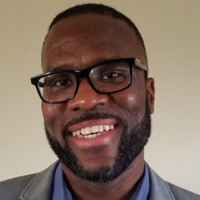Leading Others Without The Title Of Coach With Shermain Melton

You don't have to be a coach to be a leader. You need to be someone you can trust with confidence. Meet Shermain Melton, a Creation Coach and Chief Courage Officer, who started as a boss in a Pizza Hut. He is now an up-and-coming entrepreneur who is changing lives as a coach. Join Tony Martignetti and Shermain in this episode, where Shermain shares how he was already a coach before he earned the title. He discusses his work experience in managing groups of people who trusted him to do the right thing all the time and why he saw coaching as something he wants to do for the rest of his life. What is more, learn the challenges Shermain had to face as a person of color growing up and how that helped him be the person he is today.
---
Listen to the podcast here:
Leading Others Without The Title Of Coach With Shermain Melton
It is my honor to introduce you to my guest, Shermain Melton. He is a trusted advisor, problem-solver, coach and consultant. For many years, he has been helping leaders create their biggest dreams and tackle their biggest challenges. He serves leaders of color who feel like their voice is not being heard. They feel alone. They want to thrive through community and connection. Welcome to the show, Shermain.
Tony, it’s great to be here. Thank you for having me.
I’m looking forward to unveiling all of the stories that make up this person in front of me. It’s going to be exciting. What we do in the show here is we usually highlight what we call flashpoints, which are the moments that ignite your gifts into the world. There might be more than one or several, but the idea is we want you to share what you’re called to share about your story. We’ll take some stopping points and touchstones along the way to see what we’re finding and what we’re discovering about you.
One flashpoint that comes to mind for me is I was a store manager at a Pizza Hut restaurant. I’ve made the difficult decision to terminate someone. One of my team members decided to do something he wasn’t supposed to. I terminated him. He came back maybe two weeks later and said, “Shermain, I’m sorry for what I did.” I said, “No problem. You’re forgiven.” He said, “I also want to say thank you for seeing me, my skin color and treating me like a normal human and helping me grow. You never treated me differently. I had other jobs, the first thing they see is my skin color. They immediately treated me differently. Thank you so much for not doing that and for seeing me for me.”
From that perspective, what did you react to yourself? Did you have any moments for yourself where you’re like, “I totally relate with that?”
Even to this day, I still walk into places being an African-American. We’ll walk into places and the first thing I think is, “Are people seeing my skin color first and not me? Not being interested to learn more about me.” Sometimes they don’t see my education level, don’t know about my character and integrity, but sometimes I feel like when I walk into a place that’s in my mind what people are seeing so I can relate to them.
Any time you hear someone telling you something you can't do, say, "says who?"
How did that moment shift you in terms of how you treat other people because it seems like you were already coming from a place of everyone is triggered or even kill? What did that realization ignite in you for you to move forward from there?
What that ignited in me and what that revealed is that I’m present with people. People feel that when I’m with them, I’m present and that I care. When that happened, that caused me to look at how can I be even more present with my team? How can I do an even better job? The end result was my turnover numbers decreased even more. My retention numbers improved even more from that point on. In the area that I was in, my store became number one in my people numbers. That’s one of the things from the business standpoint that immediately affected that.

There’s something powerful about that. Realizing that you have the real tangible impact of being present with your people and treating them right. Usually, we’re not going right to the business impact but it’s true. By being in your full power and present, you have a big impact on the world, starting with your local business. Tell me more. What happened next?
I started to care more. We work in a restaurant, and anyone that works in a restaurant knows Friday to Sunday are your busiest days. I would buy them ice cream to say, “Thank you,” little things like that. I started to see more smiles happening. There are a lot of little shifts in the people that I was around. They were smiling more. All of a sudden, people were singing at work. In my restaurant, I had a lot of teenagers, high school students. What the other leaders would complain about how high school students were unreliable and we couldn’t depend on them to come to work. I was like, “I’ll have that problem.” That helped me focus on the environment and made it a place where people were smiling, happy and wanted to come. I didn’t have a lot of the problems that other leaders had.
There’s something I want to ask about because this came up in a conversation I had which is do you think that building trust is the foundation or there’s an element of believing in people come first or is it both?
In my opinion, trust is a foundation for everything that a leader does. It’s got to be built one interaction at a time. After that trust is built, everything else comes, loyalty comes. Everything else is built on that.
By trusting and having that ability to see these kids and teenagers, it made a big difference. I’m dying to see where you take it next because I can see that here you are, that was before. You were doing this in your prior life of managing a Pizza Hut restaurant. This experience changed you because now you see that you can have an impact. Where did this set off for you in terms of your next steps in your journey?
As far as my next steps in my journey, I decided to leave there and go be an assistant store manager with the Walmart organization. That was a completely different field, but I did the same thing there. I saw people. I made sure all the associates felt seen, heard and that they could come to me for anything. What I learned at Pizza Hut, I took that and evolved to how I become a family to others and treat them where they feel like they can come to me, speak whatever’s on their mind and feel comfortable with that. I took that with me to Walmart as I ran that organization.
Now you know that it wasn’t just a fluke. Now you know that it’s something about you that is real. What happens next?
I choose to go to a telecommunications company called Cox Communications. While I was there, I started off as a representative in their Tech Support Department and was promoted after a year. When I was promoted, one of the things I loved doing there was when I was an onboarding supervisor, all the new hires came to me. I was able to leverage helping people feel seen. There was this new opportunity to help people gain confidence because as new hires, they had very little confidence in their abilities. I was able to use all the skillsets I had learned to help them gain their confidence and abilities. One of the things I loved was for them to come back a year later or something to me and say, “Thank you so much. Look at me now, I came in at this level and now I’m super happy and confident. It’s all due to your help.” That’s one of the things I loved.
At this point in your journey, you think to yourself, “I’ve come pretty far.” You’ve been able to build some remarkable skillsets in the people side of the business like technical skills. You have those things in spades I’m sure, but in reality it was not about that. It was about the people’s skills and understanding people. You’re the one who’s being able to bring out the confidence and the presence in people. I want to know how we get to where you are now. Keep on moving.
Just by being present, you're creating a big impact on others.
I was at this organization, Cox Communications. My dad passed away from cancer when that happened. One of the things he told me that stick with me to this day was that relationships were the most important thing in the world. These experiences and trauma even caused me to think about, “Is what I’m doing the most important thing in the world? Am I adding value to people? Am I living my purpose? Am I serving others? Is there more I can be doing?” When he passed, that moment is when I decided there’s more that I can do to serve others. This started my journey into the coaching world.
That’s something that is when you know that you’ve accumulated all these great skills and a life event like this happens. Oftentimes, with these conversations, people think, “It has to be some kind of massive traumatic event.” It’s when you have a loved one who passes because it makes you start thinking about, “What is life about? What should I be doing with the rest of my life?” That’s pretty amazing especially since your father was all about relationships. Here you are, a person who already gets that probably because he passed it on to you along the way. Now you’re questioning and saying, “What can I do with all that?”
A real reflective moment of, “Where am I at? What am I doing? Is there more that I can do to serve, help, be a blessing and be a light to people in this world?” I had the opportunity to go to a leadership training program with someone. She was a coach. She was nice, asked good questions and was having a lot of fun. I’m like, “I could do that. That looks awesome.” I reflected back at my life and I’m like, “I’ve been doing this for a very long time. I just didn’t have the title coach in it. It was a leader. I was a leader. That would be super fun.” I started my journey. I went to a coaching school called iPEC and then I got connected with Rich Litvin in The Intensives.

The amount of escalation once you get the itch and you start to coach starts to escalate. When did you know that you’re like, “I’m in this for life?” Do you feel that way right now or, “This is my calling?”
I’ll be leaving my corporate job at the beginning of 2022. It’s super scary but I know I could do it. This is still fresh for me. This is something that I want to do for the rest of my life but if being honest, I still have some reservations like, “Can I do this? Am I going to be able to make this happen?” In the back of my mind, I have those fears partially because my dad was an entrepreneur and he struggled a lot to a point where my mom had to go back to work to help have that constant income coming in. That brought a lot of friction into our home because she would always remind my dad about him not doing his part. I grew up around that. Now, I have a goal of being an entrepreneur. In the back of my mind is like, “Am I going to be successful? Am I going to do my parts? Can I do this?” It’s always back there. When it comes up, I have to shift it and then push it back.
It’s great you bring that up because that’s one of the things that a lot of people glamorize the picture of the entrepreneur and make it seem like, “It’s so great. Work for yourself,” but when you grow up in a family where there is an entrepreneur and you see how they can struggle and how there are a lot of challenges of the image on the inside, it does change the picture of that. That helps for you because at least now you are going in with eyes wide open. Coming from a coaching perspective, you at least know about self-care.
I also came in eyes wide open. I know myself. One of my fears is the value of financial security. Here I am taking this leap and it’s all this unknown. What I’ve done is I’ve saved up a little nest egg, so I don’t have to worry about that and I can focus on serving people in coaching.
I’d love to know more about what’s driving you towards serving the people that you want to serve. I know we talked about it in the intro but tell me what’s pulling you forward into this?
Leaders of color. First, it’s myself. Growing up as a leader, I struggled with the connection. I didn’t feel like there were people who knew what I was going through as a leader. Thinking about the differences and the struggles that culturally we’ve had in the past. What I’m creating is something that I would have loved to have as a leader coming up which is a community, a place where I can come and be myself, accepted and challenged to do even more. Having that safe space, I would have loved to have that coming up. That’s what I provide to executives and other leaders.
That’s one thing I hear a lot around people wanting to create what was missing in their lives. That’s what makes you great at being the person to bring that because you have a real place for it to come from around this. That’s powerful. I know your path is still evolving as you go along this path. Tell me what you’ve learned about yourself that has made you who you are now.
One of the things I’ve learned about myself that’s made me who I am now is I’m loved. With anyone that I interact with, I see them and think about, “How can I be a light to this person?” It’s more so now than I was ever in the past. That’s me being a light, blessing and serving. I learned that about myself. Another thing that I learned about myself through this journey is anything’s possible. When I look at the me from years ago and compare it to the me now, I never would’ve thought that I would have been here. I put together my first group program which I never thought anyone would sign up for and people have signed up for it. I never would’ve thought I’d be at this moment.
Lenient to anything is possible. It is a great way to be in the world. In terms of the lessons that you would want to pass on to people who are reading this, if they are the ones who are you several years ago, still struggling to find out their identity, not knowing who they’re going to be, what would you tell that person? This is a slight variation to what we talked about. Go deeper.
I would tell that person to hang in there and find a community if they can. Go try to find someone else who’s going through what you are and connect with them. I would also tell them to dig in and find out what their values are. One of my top values is my faith. Maybe they have a similar value. I would tell them to explore that and lean on their faith to help them get through it. I would tell them to say the words, “Says who?” more often. When they’re being told they can’t do something, let’s say, “Says who?” You can do it. Anytime you hear someone telling you something you can’t do follow it up with, “Says who?” in your mind.
It’s so powerful because there are many people who are there to make you feel small and to set you back saying like, “You can’t do that. That’s not possible.” It’s almost like a challenge that’s being brought that you should be like, “Watch me. I’ll do it now.”
Trust is a foundation for everything that a leader does. It has to be built one interaction at a time.
One other item I was thinking as you were saying that is to think about the person they want to be and do this “I am exercise.” Let’s say they want more confidence to say, “I am confident,” to tell themselves that more often, multiple times throughout the day. They can even get more specific or to have one sentence that they tell themselves about the person that they want to be because they will start to be that person now. They’ll be that person right now if they live into it.
I’m going to take you back to the most emotional part of your journey. Obviously, besides losing your father which is very challenging, but what’s been the most emotional part of your journey?
That one was the top one. Let’s see, what’s the second most emotional part of my journey? I go back to the first program I put together. I can remember back to, “Will anyone pay for this? Am I going to fail like my dad?” Those things were constantly in my mind as I ventured into coaching. There were a lot of reflections about my dad and those struggles that he went through for a very long time. Getting myself out of that or shifting sometimes multiple times a day for those thoughts and feelings to come up and me having to shift away from it was emotional. There were a lot of times when I would break down, cry and have to get myself together and try to shift. What’s helped me is the community. I’m in multiple communities where I can speak about those things. When you have that support, it makes all the difference.
That is exactly why you’re offering community now. That’s one thing that is so important when you can create the type of thing that you think will help other people. It’s so powerful. We need a lot of community now. It’s not just about getting on Zoom and seeing faces. It’s about having a connection. I’m going to shift gears a little bit. I’m going to ask you a strange question. What’s one book that’s had a major impact on your life?
That one book is Start With Why by Simon Sinek. I love that book. It’s had a major impact because Simon talks a lot about, “Your why is your foundation for anything that you’re doing. Your why and purpose are the things that are going to help you get where you want to be.” It’s this intrinsic thing that’s drawn out from inside of you. When that thing you’re going towards is at your core, you’re going to stick with it and figure out how to do it. I love that about this book.

It’s funny how he brought something to light that we all knew that all along but we never thought about. He made it so front and center. This has been great, sharing your insights and knowing your stories. What you’re doing in the world is powerful. I’m looking forward to seeing what you’re going to do next in terms of your next steps in your journey. I want to give people an opportunity to find out how to reach you.
I am at ShermainMelton.com.
Thank you so much for coming on the show, Shermain. This is so awesome.
Thanks for having me. It’s not a problem. Thank you so much.
Important Links:
About Shermain Melton
 Shermain Melton is a Leadership Development Coach who helps leaders jump over their biggest hurdles and find themselves along the way. He has over 20 years of experience mentoring, coaching, consulting, and problem solving. He cites his father’s death as a major turning point in his life that eventually led him to his journey into becoming a coach. Beyond coaching, Shermain is also a Lead Infrastructure Engineer for American Express and has been with the company for more than 8 years.
Shermain Melton is a Leadership Development Coach who helps leaders jump over their biggest hurdles and find themselves along the way. He has over 20 years of experience mentoring, coaching, consulting, and problem solving. He cites his father’s death as a major turning point in his life that eventually led him to his journey into becoming a coach. Beyond coaching, Shermain is also a Lead Infrastructure Engineer for American Express and has been with the company for more than 8 years.


0 comments
Leave a comment
Please log in or register to post a comment